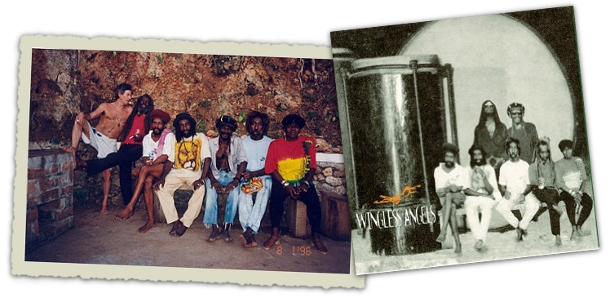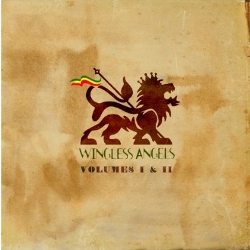Articles about reggae music, reviews, interviews, reports and more...
Keith Richards' sublime Wingless Angels

Keith Richards' sublime Wingless Angels
Rolling Stones guitarist Keith Richards re-releases a timeless set of traditional nyabinghi songs and chants.
Sampler
As an experiment, I’ve been playing the 'Wingless Angels' CDs to everyone who stops by our house for about a week now. As you can imagine, nyabinghi music isn’t everyone’s cup of tea, and reactions have been mixed. One friend who usually likes reggae offered rather dismissively, ‘I think there’s something wrong with your stereo. I can’t hear anything except for some muffled drumming and some seriously off-key vocals?’ Another friend who’s been going through a very difficult time listened to the first of the two CDs all the way through and said, ‘I feel better, more balanced. Listening to that slowed me down. It’s like a great tonic for the soul.’ But don’t let that description scare you; there’s nothing soft or New Agey about this rough and ready set of spirituals.

This collection of traditional songs – with some of the rhythms dating as far back as the 17th century in Uganda - was recorded over the last several years by Keith Richards at his Jamaican home. In 1997, Richards released some of these songs on his own record label as a CD entitled ‘Wingless Angels.’ The collection not only featured some of the greatest ‘spiritual healing’ tunes ever performed, but it was also one of the most important roots based compilations –from a musicological perspective – to be released in several years. This new updated and expanded set has a much greater breadth than the original and serves as a fine memorial for Justin Hinds, Locksley Whitlock and Jackie Ellis, three of the musicians who contributed to the original release who have since passed on.
 Keith Richards has owned a vacation home in Ocho Rios near St. Anne’s Bay, Jamaica for many years now. One of the country’s traditional rural parishes, St. Anne’s is located right in the heart of roots reggae country and is a stone’s throw away from the birthplaces of such legendary reggae musicians as Bob Marley and Burning Spear. Not surprisingly, it didn’t take long for the guitarist to meet and begin to play music with many of the local musicians, but rather than seek out the next big name in reggae as he and Mick Jagger did when they helped launch Peter Tosh’s career as a solo artist in the late nineteen seventies, Richards found himself drawn to the deeply spiritual percussion based world of the nyabinghi chant.
Keith Richards has owned a vacation home in Ocho Rios near St. Anne’s Bay, Jamaica for many years now. One of the country’s traditional rural parishes, St. Anne’s is located right in the heart of roots reggae country and is a stone’s throw away from the birthplaces of such legendary reggae musicians as Bob Marley and Burning Spear. Not surprisingly, it didn’t take long for the guitarist to meet and begin to play music with many of the local musicians, but rather than seek out the next big name in reggae as he and Mick Jagger did when they helped launch Peter Tosh’s career as a solo artist in the late nineteen seventies, Richards found himself drawn to the deeply spiritual percussion based world of the nyabinghi chant.
In essence, Nyabinghi – a word that means either ‘black victory’ or ‘she who possesses all things’ in ancient Ugandan – is a trance inducing percussive musical form designed to bring the listener and the musician closer to God and the centre of the universe. The antithesis of modern production, the sounds Richards has recorded could not be more open and spare. Rhythms are stripped down to their essentials with conga, shaker and akete repeating drum providing the musical backdrop to the singers’ invocations. The slight interventions of Richard’s droning electric guitar are infrequent and never distracting; rather they illustrate his deep understanding and empathy for the music. He resists any temptation to lay down a solo on top of a subtle harmony or overlap the rhythms with string based melodies. Instead, through careful listening and the patience born of ganja sessions that begin at dawn and carry on around the clock, he has captured the essence of a music that is as old as humanity. Who would have thought that this gangly old rock and roll pirate would have had it in him to have recorded the most rootsy set of songs captured on tape since the Lomaxes ventured into the deep south to record the music of migrant workers in the nineteen thirties? I’d go as far as to say – and you can accuse me of any heresy you’d like here – that the simple fact that Richards has released these songs for everyone to hear equals any other contribution he has hitherto made to the world’s music.
Wade Davis, the explorer in residence for the National Geographic Society, recently remarked that one of the tragedies of the modern world is that currently one language or dialect disappears from the planet every single week. As elders from traditional cultures die, so do their customs and linguistic knowledge. Seen in this light, ‘The Wingless Angels’ is a peerless work of cultural preservation that honours the ancient percussive traditions the late Justin Hinds, Jackie Ellis, and Locksley Whitlock embodied and communicated in their music. While it’s become a cliché to point out the connections between African and new world musical forms like the blues and jazz, it wouldn’t be much of a stretch to say that by listening carefully to the songs on ‘Wingless Angels’ one can hear the seeds of most of the music you’ve ever heard on the radio.
So, this music is ‘good for you’, but is it any good? As someone who has suffered through countless field recordings of dry traditional song forms recorded out of context by someone with a tin ear, I’m the first person to be wary of projects like this. Rest assured. Keith Richards’ approach to these songs embodies a perfect balance between joy and respect , and he never lets the cultural value of these recordings overshadow the sheer sublime qualities of the music itself. The versions of We Shall Overcome, Rivers of Babylon, Roll Jordan Roll and Morning Train are beautiful, uplifting and all encompassing.
To let these songs into your heart is to allow time to slow down, way down and get in touch with a world of sound that is at once familiar and completely new. This record probably won’t take the commercial world by storm, and I’m not expecting to hear about any emerging nyabinghi movements within mainstream western society, but those with open ears will marvel at the power of simple rhythms created by drums, shakers, and voices in approximate harmony to penetrate deep into the soul and release a world of trouble and care. These are vanishing sounds, and we all owe Keith Richards a profound debt for capturing this music before it’s too late. Every fan of roots music owes it to him or herself to at least give this one a listen. This is as good as music gets.
Read comments (2)
| Posted by Nicko on 12.13.2010 | |
| Yeah I'm convinced I read about this album a few weeks back. Now hearing these samples I think I may splash a little cash and buy it. Good review, thanks. | |
| Posted by Strongtree on 12.13.2010 | |
| I love nyabinghi music all that drumming and chanting very spiritual, true roots music. | |
Comments actually desactivated due to too much spams
Browse by categories
Recommended Articles
Latest articles
Recently addedView all
© 2007-2026 United Reggae. All Rights Reserved. Reproduction in whole or in part is prohibited. Read about copyright
Terms of use | About us | Contact us | Authors | Newsletter | A-Z














